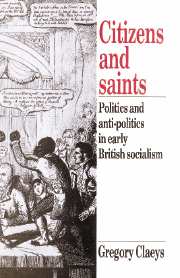Book contents
- Frontmatter
- Contents
- Acknowledgements
- List of Abbreviations
- Introduction:
- PART I THE ROOTS OF POLITICAL AND ANTIPOLITICAL SOCIALISM
- 1 Republicanism, puritanism and natural jurisprudence
- 2 Paternalism and democracy in the politics of Robert Owen
- PART II SOCIAL SCIENCE, POLITY AND ECONOMY
- PART III THE ORIGINS OF SOCIAL RADICALISM
- Bibliography
- Index
2 - Paternalism and democracy in the politics of Robert Owen
Published online by Cambridge University Press: 04 December 2009
- Frontmatter
- Contents
- Acknowledgements
- List of Abbreviations
- Introduction:
- PART I THE ROOTS OF POLITICAL AND ANTIPOLITICAL SOCIALISM
- 1 Republicanism, puritanism and natural jurisprudence
- 2 Paternalism and democracy in the politics of Robert Owen
- PART II SOCIAL SCIENCE, POLITY AND ECONOMY
- PART III THE ORIGINS OF SOCIAL RADICALISM
- Bibliography
- Index
Summary
The fact that socialism could be understood as an attempt to extend, rather than to abolish, political participation was not always evident to its radical critics. This was particularly true in the early years of the movement, when Owen was still widely perceived as a somewhat overly enthusiastic poor law reformer whose proposals bore little resemblance to the aims of working class radicals. Whatever republican elements existed in Owen's ideas were thus scarcely acknowledged by those radicals with whom he first came into contact. More disconcerting for Owen was the fact that his plans were actually rejected by many working class leaders as antagonistic to their goal of greater social and political independence. Within a short time of the advent of his national campaign for poor law reform in 1817, Owen was thus assailed by a number of political reformers on the grounds of his apparent political conservatism. Some were mainly offended by his condescending style, for instance in his use of ‘the lower orders’ to describe the working classes. Others saw in Owen's plans a subtle government ploy to upset radical strategies. Among the rumours then afloat among the reformers, Richard Carlile later recalled, one was ‘that Mr. Owen was an instrument of the Government, to bring forward his plan of providing for the lower classes, for the purpose of drawing their attention from Parliamentary reform’. Writing in April 1817, the radical journalist W. T.
- Type
- Chapter
- Information
- Citizens and SaintsPolitics and Anti-Politics in Early British Socialism, pp. 63 - 106Publisher: Cambridge University PressPrint publication year: 1989

